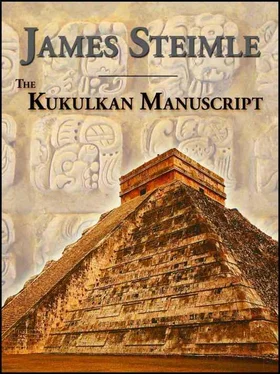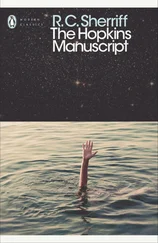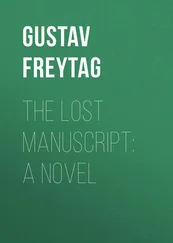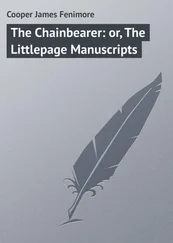James Steimle - The Kukulkan Manuscript
Здесь есть возможность читать онлайн «James Steimle - The Kukulkan Manuscript» весь текст электронной книги совершенно бесплатно (целиком полную версию без сокращений). В некоторых случаях можно слушать аудио, скачать через торрент в формате fb2 и присутствует краткое содержание. Жанр: Прочие приключения, на английском языке. Описание произведения, (предисловие) а так же отзывы посетителей доступны на портале библиотеки ЛибКат.
- Название:The Kukulkan Manuscript
- Автор:
- Жанр:
- Год:неизвестен
- ISBN:нет данных
- Рейтинг книги:5 / 5. Голосов: 1
-
Избранное:Добавить в избранное
- Отзывы:
-
Ваша оценка:
- 100
- 1
- 2
- 3
- 4
- 5
The Kukulkan Manuscript: краткое содержание, описание и аннотация
Предлагаем к чтению аннотацию, описание, краткое содержание или предисловие (зависит от того, что написал сам автор книги «The Kukulkan Manuscript»). Если вы не нашли необходимую информацию о книге — напишите в комментариях, мы постараемся отыскать её.
The Kukulkan Manuscript — читать онлайн бесплатно полную книгу (весь текст) целиком
Ниже представлен текст книги, разбитый по страницам. Система сохранения места последней прочитанной страницы, позволяет с удобством читать онлайн бесплатно книгу «The Kukulkan Manuscript», без необходимости каждый раз заново искать на чём Вы остановились. Поставьте закладку, и сможете в любой момент перейти на страницу, на которой закончили чтение.
Интервал:
Закладка:
“You don’t want to do this?” Porter questioned as her eyes wandered down and over the papers throttling her chair.
From the floor, she lifted a thick pad of pages bound by one heavy paper clip and said, “Frankly, I was hoping to do a dissertation on early Athapaskin settlements.”
“Who are they?”
“The Athapaskins?” She looked up at him, her eyes wide and wondering if he was joking. “The ancestors of…many North American Indian tribes. Tell me, how is it that you are leading a study on an ancient Mesoamerican find without knowing the rudiments of American archaeology?”
“Just lucky I guess,” he said. “You already know I have religious interest in Mesoamerican history.”
“Yes, but I hardly believe someone’s religion validates a worthy academic assessment of an area outside one’s expertise.” She looked down and dragged her eyes over the paper in her hands. “This is written in Spanish. What is it?”
“Nothing you’d be interested in. Solid evidence of the authenticity of the Book of Mormon. It’s an ancient Indian history compiled by a Aztec prince.”
“Ixtlilxochitl?” she said, trying to find the first page-an impossible task.
Porter waved his head in what might have been a nod. “Seems his curiosity about the white, bearded god revealed some finds so disturbing that after the book was shipped to Spain, it got buried in the archives of a church until only recently. Of course, now that it has been so long since the original writing, scholars can say the man made the entire thing up based on his own religious system. But it does back up facts already in our grasp.”
“The white, bearded god,” Alred said. “And who would that be?”
“Don’t you know?” Porter said, glowing with his quirky smile.
She waited a few seconds before answering, her eyes examining the titles of stapled articles and worn books ganging up on her chair. She saw the words, “The Canaanite Text from Brazil” by Cyrus H. Gordon and “Who Discovered America First” by William F. Dankenbring. Some of the words leapt at her in Germanic, Arabic, and other languages that left her feeling like she didn’t belong in this office.
Looking again at Porter, she said, “Mormons believe Quetzalcoatl, Kukalkan, Tohil, or whatever one might call him…is none other than Jesus Christ, don’t they?”
Porter’s face didn’t change. “Some do.”
“Don’t you know Quetzalquatl was represented by a feathered serpent? The serpent in Bible stories represents the Devil, if I understand the symbolism correctly. How do you get Jesus in there.” She put the document back from where she’d snatched it, sorry she’d picked it up.
“You’re forgetting the caduceus,” Porter said, leaning back in his small chair. He crossed his arms and looked completely at ease.
“I beg your pardon?”
“The symbol of the medical profession?” he said. “Two serpents wrapping around a pole with wings? It was the staff of the Greek god Hermes.”
“I know what you’re talking about, but I don’t see how that has anything to do with Quetzalquatl or the Devil.”
“It is quite arguable that the caduceus is also based on an often forgotten Biblical story found in the book of Numbers,” said Porter.
Alred pursed her lips and raised her eyebrows.
“While the Hebrews wandered in the wilderness after Moses freed them from Egypt, the Torah states that they encountered ha-nechashim ha-seraphim, fiery or poisonous snakes.”
“Torah,” said Alred, “I thought you said this was in the book of Numbers.”
Porter nodded, shutting his eyes momentarily at her biblical ignorance. “Many were bitten by the serpents and needed serious medical attention, death being the alternative. Moses constructed a pole with a serpent made of brass on the top of it. He told the dying all they needed to do was look at the brass serpent, and they’d be healed.”
“That’s it?” Alred said, disappointed.
Shaking his head, Porter said, “But too many of the afflicted children of Israel wouldn’t believe they could be healed that easily…even after all the miracles preceding the experience. Some looked up, following the admonition, and were healed.
“Now the snake Moses made obviously didn’t represent the Devil. On the contrary, both 2 Kings and 2 Chronicles recount the sins of the children of Israel in worshipping the pole with the bronze serpent, many years latter.
“Now, Christians compare the brass serpent, which was ‘lifted up,’ to Jesus Christ, who was put up in like manner, and forever after all followers of Jesus have professed to the world that all anyone need do is look to the man on the cross…and live.”
Alred squinted her eyes. “So you’re saying the serpent on the pole of Moses was Jesus, who is also Quetzalcoatl.” Doubt laced her tone.
“Can’t you see why some people would make the connection?” said Porter.
After swabbing the inside of her dry mouth with her tongue, Alred said, “I once had a grammar school teacher who played a game with us wherein we compared different kitchen utensils to aspects of learning. I remember a spoon related to a teacher in detail, a piece of paper to our brain, and a knife to our principal. But I–I don’t think abstract or arbitrary connections should be taken seriously. Rhetorics can show how any two unrelated things are connected.”
Porter wiped his eyes. “Yet wouldn’t you agree that finding logical connection is the center of scholarship? What else is a dissertation?”
She chewed on the inside of her lip. “As scholars we can only do our best.”
Leaning suddenly forward in his chair, Porter said, “I wish other scholars were as honest as you! You’re right, of course. None of us are as enlightened as we’d like to believe. The problem with the Enlightened thinkers of Rousseau’s day was that they thought they saw the truth. Not just reality, but absolute truth! They chose to believe that there was nothing more than what they were seeing. It’s…a problem we all have…to some degree or another. We focus on paradigms we’ve collected over the years, without acknowledging the existence of paradigms. You and I might know what paradigms are-a pattern or model of reality defined by our own thoughts and observations-but we go on living with them, without consideration of the other paradigms in the world. So who’s right? No one. Who thinks they’re right? Everyone. What’s right? Will we ever really know-that is what we should ask ourselves.”
“But that’s a philosophical question, not a historical one,” Alred said.
“Right. And I’m not implying we should do away with historians…I’d be out of a job!” Porter said, throwing up his hands. “What we are forced to deal with are… possible…truths based on all the finds in our possession.”
“ Possible is the key word,” Alred noted. “Scholars don’t want to deal with possibilities that are so improbable as to be defined as near impossibilities.”
“Of course,” Porter said, his chair squeaking again as he leaned back. “The only thing that has greatly bothered me is that most scholars only acknowledge possibilities they like. Some possibilities grind against their feelings.
“You can’t mix business and emotions, they rarely work well together, no matter your office or profession. If you and the rest of the planet are inclined to believe that the world is flat, for example, and you worry about what your friends and associates will feel if you were to acknowledge the possibility that you might think the world is round, you’ll be wise to keep your mouth shut until everyone believes the same thing.”
“Of course, there’s always someone who likes to stand out,” said Alred.
Porter agreed with a raised hand. “Shouting their beliefs even if they know few will receive them kindly. The majority is always slow to change opinions, and only does so when the populous of scientists begins to move toward the idea that the world might actually be round. At that point, you wouldn’t have as large a problem in telling everyone that you might believe the world round as well. But you see, emotions-worry in this case-really get in the way.” Porter folded his arms.
Читать дальшеИнтервал:
Закладка:
Похожие книги на «The Kukulkan Manuscript»
Представляем Вашему вниманию похожие книги на «The Kukulkan Manuscript» списком для выбора. Мы отобрали схожую по названию и смыслу литературу в надежде предоставить читателям больше вариантов отыскать новые, интересные, ещё непрочитанные произведения.
Обсуждение, отзывы о книге «The Kukulkan Manuscript» и просто собственные мнения читателей. Оставьте ваши комментарии, напишите, что Вы думаете о произведении, его смысле или главных героях. Укажите что конкретно понравилось, а что нет, и почему Вы так считаете.












